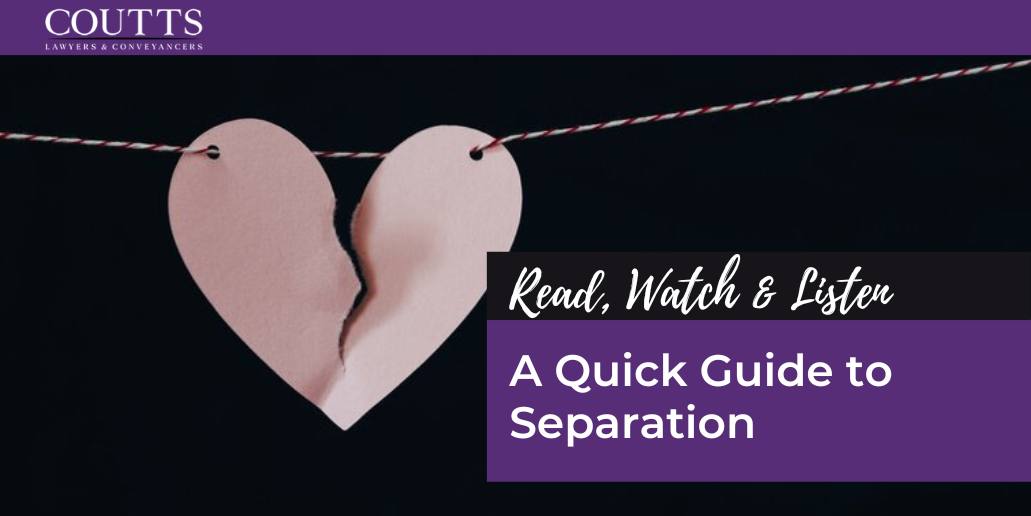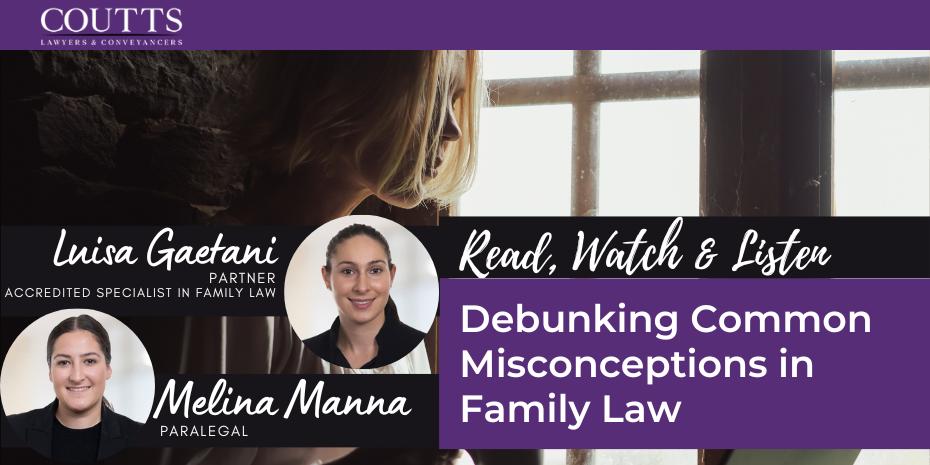These are steps you need to take when a party to a marriage or de facto relationship decides to separate.
KEY TAKE OUTS:
- This article will detail the steps required to be undertaken by a party seeking to separate.
- The Family Law Act is the relevant legislation providing guidance on how a property settlement should be undertaken.
- The Family Law Act is the relevant legislation providing guidance on what to look at in terms of custody arrangements.
When a party to a marriage or de facto relationship decides to separate, there are a number of steps that need to be undertaken:
- Record the date of separation. It is very important when you separate that you record the date of separation. The date of separation becomes relevant when you are applying for Divorce, as the Court needs to ensure that you have been separated for 12 months before they can grant the divorce;
- Update your will. When you separate, your circumstances have changed significantly and it is very important that you update your Will to reflect that you have separated, otherwise your spouse or de facto partner may receive an inheritance under your estate if you were to pass away;
- Seek advice regarding your entitlements to a property settlement. Depending on the length of your relationship, and whether you have joint assets, you may be eligible to claim a property settlement from your spouse or de facto partner. The Family Law Act provides guidance as to the factors required in considering what an appropriate split of the property would be. This can be a complex task, as we need to look at the assets and liabilities of the parties, the contributions of the parties and the future needs of the parties. The final agreement needs to be just and equitable;
- Seek advice regarding your entitlements to custody arrangements. When separation occurs, a lot of the time there is confusion as to what is appropriate arrangements for the care of the children. The Family Law Act provides for the children’s best interests to be of paramount consideration when dealing with custody issues. The Court try to maintain a meaningful relationship with both of the parents unless there is risk of harm to the child/ren;
- Engage in negotiations regarding property settlement and/or custody arrangements. This process can include financial disclosure where the parties provide each other with information such as funds in bank accounts, credit cards, tax returns, superannuation statements and many others. This process assists in determining what the value of the pool is to distribute;
- If negotiations are successful, prepare Consent Orders or a binding financial agreement to formalise your agreement. These documents provide for the ending of the financial relationship between the parties and if one party is transferring the former matrimonial home into their sole name, it will provide for an exemption of stamp duty. There are many benefits to having your agreement formalised by way of Consent Orders or a Binding Financial Agreement;
- If negotiations are unsuccessful, engage in the process of Mediation. The process of Mediation can be done privately or through a Government body, such as Family Relationships Australia. The process of Mediation involves an independent third party who attempts to assist the parties to find solutions to issues and resolve their disputes indefinitely;
- If Mediation is unsuccessful, initiate proceedings in the Family Court of Australia or the Federal Circuit Court of Australia. It will depend on the complexity of the matter as to whether it would be appropriate to initiate proceedings in the Family Court or the Federal Circuit Court. In parenting matters, the documents to file include an Initiating Application, Affidavit and Notice of Risk. In property matters, the documents to file include an Initiating Application, Affidavit and Financial Statement; and
- After you have been separated for 12 months, you can file for Divorce. To file for divorce, you need to prove to the Court that you have been separated for 12 months, that you have jurisdiction to file an Application in Australia and that your marriage has irretrievably broken down. The Court also needs to be convinced that if you have children to the marriage, that there are proper arrangements in place in relation to the care of the children. This process can be undertaken by filing a document called ‘Application for Divorce’ with the Court.
ABOUT LUISA GAETANI:

Luisa is a Senior Associate at Coutts Lawyers & Conveyancers and head of our Family and Criminal Law divisions. Luisa has practiced solely in the areas of criminal and family law. It is her sensitive yet pragmatic approach that has allowed her to develop a strong rapport and build trusting relationships with her clients. Should a client’s matter proceed to court, Luisa has the skillset and experience to assist her clients through this process and where required, will draw upon her network of barristers to further benefit her client’s outcomes.
For further information please don’t hesitate to contact:
Luisa Gaetani
Senior Associate
luisa@couttslegal.com.au
1300 268 887
Contact Sydney Lawyers today.
This blog is merely general and non specific information on the subject matter and is not and should not be considered or relied on as legal advice. Coutts is not responsible for any cost, expense, loss or liability whatsoever in relation to this blog, including all or any reliance on this blog or use or application of this blog by you.



